|
GPCP Published Cancer Genetics Studies
|
1. What happens in the long term: Uptake of cancer surveillance and prevention strategies among at-risk relatives with pathogenic variants detected via cascade testing (Cancer, 2022).
 At Weill Cornell Medicine we aimed to change the paradigm of genetic testing for at-risk family members. We developed an innovative program whereby a patient navigator works with family members to assist with the complex process of genetic testing. When patient navigators work with families with hereditary cancer syndromes, relatives have improved access to genetic testing. Furthermore, this testing results in medical interventions (e.g. mammograms, MRIs, colonoscopy, and breast gynecologic risk-reducing surgery). At Weill Cornell Medicine we aimed to change the paradigm of genetic testing for at-risk family members. We developed an innovative program whereby a patient navigator works with family members to assist with the complex process of genetic testing. When patient navigators work with families with hereditary cancer syndromes, relatives have improved access to genetic testing. Furthermore, this testing results in medical interventions (e.g. mammograms, MRIs, colonoscopy, and breast gynecologic risk-reducing surgery).
Article available at: https://doi.org/10.1002/cncr.34482
|
2. Cascade Testing for Hereditary Cancer Syndromes: Should We Move Toward Direct Relative Contact? A Systematic Review and Meta-Analysis (Journal of Clinical Oncology, 2022)
 Our team reviewed the existing papers on the topic of family testing for hereditary cancer syndromes and published the first meta-analysis on clinician-facilitated care delivery to relatives. We found that clinician facilitated cascade testing across the world results in a significant improvement in rates of family member genetic counseling and testing. Our team reviewed the existing papers on the topic of family testing for hereditary cancer syndromes and published the first meta-analysis on clinician-facilitated care delivery to relatives. We found that clinician facilitated cascade testing across the world results in a significant improvement in rates of family member genetic counseling and testing.
Article available at: https://doi.org/10.1200/JCO.22.00303
|
3. Barriers to completion of cascade genetic testing: how can we improve the uptake of testing for hereditary breast and ovarian cancer syndrome? (Familial Cancer, 2022).
 In families with a known hereditary cancer syndrome, more than 70% of relatives, who have as high as a 50% risk of having the same syndrome, do not undergo genetic testing. This is a critical missed opportunity for cancer prevention and early detection. Even when relatives are aware of their risk for a cancer syndrome, concerns about the cost of genetic testing, genetic discrimination, and fear of positive test results are significant barriers to genetic testing. These findings will help us as we design future trials to improve family communication and testing. In families with a known hereditary cancer syndrome, more than 70% of relatives, who have as high as a 50% risk of having the same syndrome, do not undergo genetic testing. This is a critical missed opportunity for cancer prevention and early detection. Even when relatives are aware of their risk for a cancer syndrome, concerns about the cost of genetic testing, genetic discrimination, and fear of positive test results are significant barriers to genetic testing. These findings will help us as we design future trials to improve family communication and testing.
Article available at: https://doi.org/10.1007/s10689-022-00316-x
|
4. Risk of gastric cancer and utility of endoscopic screening for Lynch syndrome patients (Foregut, 2023)
 Lynch syndrome is a hereditary cancer syndrome that significantly increases the risk of several cancers, including gastric cancer. This paper comprehensively synthesized data on the effectiveness of gastric cancer screening via endoscopy among Lynch syndrome patients, finding that gastric cancer was detected in 2% of patients who underwent surveillance endoscopy. These results help patients recognize the probability of finding gastric cancer via endoscopic surveillance, and also inform cancer surveillance guidelines for Lynch syndrome.
Lynch syndrome is a hereditary cancer syndrome that significantly increases the risk of several cancers, including gastric cancer. This paper comprehensively synthesized data on the effectiveness of gastric cancer screening via endoscopy among Lynch syndrome patients, finding that gastric cancer was detected in 2% of patients who underwent surveillance endoscopy. These results help patients recognize the probability of finding gastric cancer via endoscopic surveillance, and also inform cancer surveillance guidelines for Lynch syndrome.
Article available at: https://doi.org/10.1177/26345161221147744
|
5. Do people with hereditary cancer syndromes inform their at-risk relatives? A systematic review and meta-analysis (PEC Innovation, 2023)
 Building on our prior work studying family genetic testing rates when someone with a hereditary cancer syndrome is identified in the family, we conducted a meta-analysis evaluating what proportion of their relatives do people with hereditary cancer syndromes inform. Currently, the most common way for relatives to learn that they are at risk for a hereditary cancer syndrome is currently through the family member who was first identified with the syndrome. Informing relatives of their risk is the critical first step in this process. Our meta-analysis found that 30% of relatives remain uninformed of their risk, and of those informed, fewer than half ultimately complete genetic testing.
Building on our prior work studying family genetic testing rates when someone with a hereditary cancer syndrome is identified in the family, we conducted a meta-analysis evaluating what proportion of their relatives do people with hereditary cancer syndromes inform. Currently, the most common way for relatives to learn that they are at risk for a hereditary cancer syndrome is currently through the family member who was first identified with the syndrome. Informing relatives of their risk is the critical first step in this process. Our meta-analysis found that 30% of relatives remain uninformed of their risk, and of those informed, fewer than half ultimately complete genetic testing.
Article available at:https://doi.org/10.1016/j.pecinn.2023.100138
|
6. Patient perspectives on risk-reducing salpingectomy with delayed oophorectomy for ovarian cancer risk-reduction: A review of the literature (Gynecologic Oncology, 2023)
 Increasing evidence suggests the fallopian tube as the site of origin for ovarian cancers. Several ongoing trials are evaluating salpingectomy with delayed oophorectomy for ovarian cancer risk reduction and patients are beginning to ask their clinicians about this surgical option. We evaluated patient preferences regarding surgery for ovarian cancer prevention in order to provide clinicians with an understanding of patient values, concerns, and priorities surrounding ovarian cancer risk-reducing surgery. Factors that impact patient decision-making include avoiding surgical menopause, preservation of fertility, sexual function, oncologic safety, surgical complications.
Increasing evidence suggests the fallopian tube as the site of origin for ovarian cancers. Several ongoing trials are evaluating salpingectomy with delayed oophorectomy for ovarian cancer risk reduction and patients are beginning to ask their clinicians about this surgical option. We evaluated patient preferences regarding surgery for ovarian cancer prevention in order to provide clinicians with an understanding of patient values, concerns, and priorities surrounding ovarian cancer risk-reducing surgery. Factors that impact patient decision-making include avoiding surgical menopause, preservation of fertility, sexual function, oncologic safety, surgical complications.
Article available at:https://doi.org/10.1016/j.ygyno.2023.04.006
|
7. Web-based tool for cancer family history collection: A Prospective Randomized Controlled Trial (Gynecologic Oncology, 2023)
 Approximately 1% of individuals have a hereditary cancer predisposition syndrome, however, the majority are not aware. Collecting a cancer family history can triage patients to receive genetic testing. We evaluated a web-based tool for family history collection in a randomized controlled trial. Among 140 participants offered the web-based tool, 78% completed it. The web-based tool resulted in collection of higher quality cancer family history compared to clinician collection. Participants completing the web-based tool (vs. usual care) were more likely to complete genetic counseling and testing.
Approximately 1% of individuals have a hereditary cancer predisposition syndrome, however, the majority are not aware. Collecting a cancer family history can triage patients to receive genetic testing. We evaluated a web-based tool for family history collection in a randomized controlled trial. Among 140 participants offered the web-based tool, 78% completed it. The web-based tool resulted in collection of higher quality cancer family history compared to clinician collection. Participants completing the web-based tool (vs. usual care) were more likely to complete genetic counseling and testing.
Article available at: https://doi.org/10.1016/j.ygyno.2023.04.001
|
8. Obesity promotes breast epithelium DNA damage in women carrying a germline mutation in BRCA1 or BRCA2 (Science Translational Medicine, 2023)
 Obesity is an established risk factor for breast cancer among women in the general population after menopause. Whether elevated BMI is a risk factor for women with a germline mutation in BRCA1/2 is less clear. Here, we show that DNA damage in normal breast tissue from women with BRCA1/2 mutations is positively correlated with BMI and with biomarkers of metabolic dysfunction. Overall, our results provide mechanistic evidence in support of a link between obesity and breast cancer development in BRCA mutation carriers. This suggests that maintaining a lower body weight or pharmacologically targeting estrogen or metabolic dysfunction may reduce the risk of breast cancer in this population.
Obesity is an established risk factor for breast cancer among women in the general population after menopause. Whether elevated BMI is a risk factor for women with a germline mutation in BRCA1/2 is less clear. Here, we show that DNA damage in normal breast tissue from women with BRCA1/2 mutations is positively correlated with BMI and with biomarkers of metabolic dysfunction. Overall, our results provide mechanistic evidence in support of a link between obesity and breast cancer development in BRCA mutation carriers. This suggests that maintaining a lower body weight or pharmacologically targeting estrogen or metabolic dysfunction may reduce the risk of breast cancer in this population.
Article available at:https://www.science.org/doi/10.1126/scitranslmed.ade1857
|
9. Underrepresentation of racial and ethnic minorities in cascade testing for hereditary cancer syndromes (European Journal of Human Genetics, 2023)
 It is possible that there are differences in uptake of cascade testing between racial and ethnic groups; it is already known that there is disproportionate under-recognition of hereditary cancer syndromes amongst racial and ethnic minorities. We found that the uptake of cascade genetic testing for hereditary cancer syndromes by racial and ethnic minority groups is not well elucidated. Among eight trials currently evaluating interventions for cascade testing registered on clinicaltrials.gov, six (75%) do not include the influence of race and ethnicity on uptake of cascade testing as a primary or secondary objective. Our findings indicate the need for studies of cascade testing within diverse populations.
It is possible that there are differences in uptake of cascade testing between racial and ethnic groups; it is already known that there is disproportionate under-recognition of hereditary cancer syndromes amongst racial and ethnic minorities. We found that the uptake of cascade genetic testing for hereditary cancer syndromes by racial and ethnic minority groups is not well elucidated. Among eight trials currently evaluating interventions for cascade testing registered on clinicaltrials.gov, six (75%) do not include the influence of race and ethnicity on uptake of cascade testing as a primary or secondary objective. Our findings indicate the need for studies of cascade testing within diverse populations.
Article available at:https://doi.org/10.1038/s41431-023-01364-2
|
10. Systematic evidence review and meta-analysis of outcomes associated with cancer genetic counseling (Genetics in Medicine, 2023)
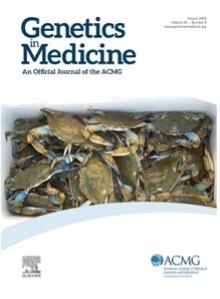 Genetic counseling is a standard part of genetic cancer risk assessment, but its true impact on patient outcomes is not well understood. This systematic review and meta-analysis of 25 studies revealed that pre-test genetic counseling improves knowledge, reduces worry, and lowers perceived risk, but does not significantly impact anxiety, depression, or patient satisfaction. Genetic counseling also improved genetic test ordering and reduced inappropriate services but had little effect on cancer prevention behaviors or accurate risk assessment.
Genetic counseling is a standard part of genetic cancer risk assessment, but its true impact on patient outcomes is not well understood. This systematic review and meta-analysis of 25 studies revealed that pre-test genetic counseling improves knowledge, reduces worry, and lowers perceived risk, but does not significantly impact anxiety, depression, or patient satisfaction. Genetic counseling also improved genetic test ordering and reduced inappropriate services but had little effect on cancer prevention behaviors or accurate risk assessment.
Article available at:https://doi.org/10.1016/j.gim.2023.100980
|
11. Partner and localizer of BRCA2 (PALB2) pathogenic variants and ovarian cancer: A systematic review and meta-analysis (Gynecologic Oncology, 2023)
 Around 20% of patients with ovarian cancer are found to have hereditary cancer syndromes, with commonly associated genes including BRCA1/2 and Lynch syndrome genes. The association between PALB2 germline variants and ovarian cancer is less clear. This meta-analysis reviewed 55 studies involving over 48,000 people with ovarian cancer and found that individuals with ovarian cancer are 2.48 times more likely to carry a PALB2 variant compared to the general population, and 0.4% of ovarian cancer patients have a PALB2 mutation. These results provide important insight for PALB2 mutation carriers to understand their risk for ovarian cancer.
Around 20% of patients with ovarian cancer are found to have hereditary cancer syndromes, with commonly associated genes including BRCA1/2 and Lynch syndrome genes. The association between PALB2 germline variants and ovarian cancer is less clear. This meta-analysis reviewed 55 studies involving over 48,000 people with ovarian cancer and found that individuals with ovarian cancer are 2.48 times more likely to carry a PALB2 variant compared to the general population, and 0.4% of ovarian cancer patients have a PALB2 mutation. These results provide important insight for PALB2 mutation carriers to understand their risk for ovarian cancer.
Article available at:https://doi.org/10.1016/j.ygyno.2023.07.017
|
12. Chatbot Artificial Intelligence for Genetic Cancer Risk Assessment and Counseling: A Systematic Review and Meta-Analysis (Journal of Clinical Oncology Clinical Cancer Informatics, 2023)
 Many individuals with hereditary cancer syndromes are unaware of their genetic status due to underutilization of genetic cancer risk assessment. Chatbots, which simulate conversation using artificial intelligence, are emerging as potential patient-facing tool for genetic cancer risk assessment and counseling. This systematic review evaluated seven studies on chatbot use in this context, finding a pooled completion rate of 36.7% for genetic risk assessment. These data demonstrate that although chatbots hold promise for reducing barriers to genetic services, further research is needed to assess the effectiveness of chatbots and their impact on equitable access to genetic counseling.
Many individuals with hereditary cancer syndromes are unaware of their genetic status due to underutilization of genetic cancer risk assessment. Chatbots, which simulate conversation using artificial intelligence, are emerging as potential patient-facing tool for genetic cancer risk assessment and counseling. This systematic review evaluated seven studies on chatbot use in this context, finding a pooled completion rate of 36.7% for genetic risk assessment. These data demonstrate that although chatbots hold promise for reducing barriers to genetic services, further research is needed to assess the effectiveness of chatbots and their impact on equitable access to genetic counseling.
Article available at:https://doi.org/10.1200/CCI.23.00123
|
13. “Go ahead and screen” - advice to healthcare systems for routine lynch syndrome screening from interviews with newly diagnosed colorectal cancer patients (Hereditary Cancer in Clinical Practice, 2023)
 Lynch syndrome is the leading cause of inherited colorectal cancer, and universal tumor screening is recommended for newly diagnosed colorectal cancer patients to identify those with Lynch syndrome. However, implementation of universal tumor screening is inconsistent across health systems. This study conducted in-depth interviews with 75 colorectal cancer patients from diverse U.S. regions, revealing that most patients were unaware of Lynch syndrome but strongly supported universal tumor screening as a standard care practice. Patients emphasized the importance of "knowledge is power," family awareness, prevention, and treatment, highlighting the need for health systems to adopt universal tumor screening and optimize Lynch syndrome screening programs to improve patient outcomes.
Lynch syndrome is the leading cause of inherited colorectal cancer, and universal tumor screening is recommended for newly diagnosed colorectal cancer patients to identify those with Lynch syndrome. However, implementation of universal tumor screening is inconsistent across health systems. This study conducted in-depth interviews with 75 colorectal cancer patients from diverse U.S. regions, revealing that most patients were unaware of Lynch syndrome but strongly supported universal tumor screening as a standard care practice. Patients emphasized the importance of "knowledge is power," family awareness, prevention, and treatment, highlighting the need for health systems to adopt universal tumor screening and optimize Lynch syndrome screening programs to improve patient outcomes.
Article available at:https://doi.org/10.1186/s13053-023-00270-4
|
14. Implementation of a smartphone survey and mainstreaming for genetic cancer risk assessment in a diverse, urban, Medicaid-predominant gynecology clinic: a step toward health equity (American Journal of Obstetrics and Gynecology, 2024)
 Fewer than 5% of individuals with hereditary cancer syndromes are aware of their high-risk status, with under-recognition more pronounced among historically underserved populations. Our group developed a smartphone-based genetic cancer risk assessment (GCRA) survey and evaluated its use in a gynecology practice for publicly insured patients. The tool was completed by 70% of participants offered, identifying over 25% as eligible for genetic testing, the vast majority of whom completed genetic testing to learn their risk. The study demonstrates that smartphone-based tools can effectively identify high-risk individuals in clinic settings and facilitate equitable access to genetic testing among underserved populations.
Fewer than 5% of individuals with hereditary cancer syndromes are aware of their high-risk status, with under-recognition more pronounced among historically underserved populations. Our group developed a smartphone-based genetic cancer risk assessment (GCRA) survey and evaluated its use in a gynecology practice for publicly insured patients. The tool was completed by 70% of participants offered, identifying over 25% as eligible for genetic testing, the vast majority of whom completed genetic testing to learn their risk. The study demonstrates that smartphone-based tools can effectively identify high-risk individuals in clinic settings and facilitate equitable access to genetic testing among underserved populations.
Article available at:https://doi.org/10.1016/j.ajog.2024.01.009
|
15. Integration and usability of a digital cancer risk stratification tool to optimize identification of patients at risk for hereditary cancers: A pilot study (Gynecologic Oncology, 2024)
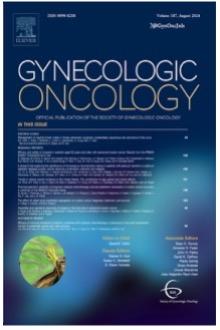 This pilot study evaluated the usability and clinical outcomes of a digital cancer risk stratification tool in a gynecologic oncology clinic. Out of 130 patients, 72% completed the tool, which assessed eligibility for genetic testing and breast cancer risk. The tool was generally well-liked by patients as reported through surveys. The tool identified 65% of patients as eligible for genetic testing, and 38% were candidates for enhanced breast cancer screening. This study adds to our group’s previously reported evaluations of digital tools for genetic cancer risk assessment.
This pilot study evaluated the usability and clinical outcomes of a digital cancer risk stratification tool in a gynecologic oncology clinic. Out of 130 patients, 72% completed the tool, which assessed eligibility for genetic testing and breast cancer risk. The tool was generally well-liked by patients as reported through surveys. The tool identified 65% of patients as eligible for genetic testing, and 38% were candidates for enhanced breast cancer screening. This study adds to our group’s previously reported evaluations of digital tools for genetic cancer risk assessment.
Article available at:https://doi.org/10.1016/j.ygyno.2024.02.028
|
16. Personalized survivorship care: Routine breast cancer risk assessment in the gynecologic oncology clinic (Gynecologic Oncology, 2024)
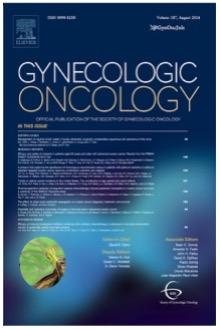 Breast cancer risk assessment models can quantify individuals’ lifetime breast cancer risk based on their unique risk factors, and can inform guideline-based breast cancer surveillance recommendations. This study evaluated the use of a web-based tool in a gynecologic oncology clinic to assess breast cancer risk using four validated models. Among 99 patients, the Tyrer-Cuzick model identified 21.6% of patients as having a ≥20% lifetime risk of breast cancer. Patients identified as high-risk were successfully referred to a high-risk breast clinic. The study suggests that incorporating breast cancer risk assessments in gynecologic oncology clinics is feasible and beneficial for identifying patients at elevated risk.
Breast cancer risk assessment models can quantify individuals’ lifetime breast cancer risk based on their unique risk factors, and can inform guideline-based breast cancer surveillance recommendations. This study evaluated the use of a web-based tool in a gynecologic oncology clinic to assess breast cancer risk using four validated models. Among 99 patients, the Tyrer-Cuzick model identified 21.6% of patients as having a ≥20% lifetime risk of breast cancer. Patients identified as high-risk were successfully referred to a high-risk breast clinic. The study suggests that incorporating breast cancer risk assessments in gynecologic oncology clinics is feasible and beneficial for identifying patients at elevated risk.
Article available at:https://doi.org/10.1016/j.ygyno.2024.03.004
|
17. Cost-effectiveness of BRCA1 testing at time of obstetrical prenatal carrier screening for cancer prevention (American Journal of Obstetrics and Gynecology, 2024)
 Screening pregnant or preconception reproductive-aged women for BRCA1 may present a unique opportunity to perform population-based screening for patients at a time where precancer screening, chemoprevention and/or risk reducing surgery may be beneficial. This study found that the addition of BRCA1 testing to obstetrical prenatal carrier screening is a cost-effective management strategy to identify at-risk women at a time when cancer screening and preventive strategies can be effective.
Screening pregnant or preconception reproductive-aged women for BRCA1 may present a unique opportunity to perform population-based screening for patients at a time where precancer screening, chemoprevention and/or risk reducing surgery may be beneficial. This study found that the addition of BRCA1 testing to obstetrical prenatal carrier screening is a cost-effective management strategy to identify at-risk women at a time when cancer screening and preventive strategies can be effective.
Article available at:https://doi.org/10.1016/j.ajog.2024.04.014
|
18. Benchmarking multi-ancestry prostate cancer polygenic risk scores in a real-world cohort. (PLOS Computational Biology, 2024)
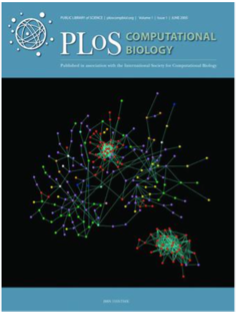 Prostate cancer is a heritable disease with ancestry-biased incidence and mortality, and polygenic risk scores (PRSs) offer promising advancements in predicting disease risk. However, research aimed at enhancing their effectiveness within African and Asian populations has been limited. This study benchmarked the predictive power of six widely used PRS derivation algorithms, finding modest improvement in discriminatory ability, and underscoring the importance of improving upon risk prediction algorithms and the sampling of diverse cohorts.
Prostate cancer is a heritable disease with ancestry-biased incidence and mortality, and polygenic risk scores (PRSs) offer promising advancements in predicting disease risk. However, research aimed at enhancing their effectiveness within African and Asian populations has been limited. This study benchmarked the predictive power of six widely used PRS derivation algorithms, finding modest improvement in discriminatory ability, and underscoring the importance of improving upon risk prediction algorithms and the sampling of diverse cohorts.
Article available at:https://doi.org/10.1371/journal.pcbi.1011990
|
19. Cascade genetic testing for hereditary cancer syndromes: Barriers and breakthroughs. (Familial Cancer, 2024)
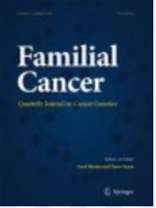 Cascade genetic testing, or the testing of at-risk relatives, is extremely promising as it offers genetic testing and potentially life-saving risk-reduction strategies to a population exponentially enriched for the risk of carrying a cancer-associated pathogenic variant. Here, we review the published research on cascade testing, evaluating barriers to cascade genetic testing for hereditary cancer syndromes and exploring strategies to mitigate these barriers, with the goal of promoting increased uptake of cascade genetic testing.
Cascade genetic testing, or the testing of at-risk relatives, is extremely promising as it offers genetic testing and potentially life-saving risk-reduction strategies to a population exponentially enriched for the risk of carrying a cancer-associated pathogenic variant. Here, we review the published research on cascade testing, evaluating barriers to cascade genetic testing for hereditary cancer syndromes and exploring strategies to mitigate these barriers, with the goal of promoting increased uptake of cascade genetic testing.
Article available at:https://doi.org/10.1007/s10689-024-00373-4
|
20. Population-level identification of patients with Lynch syndrome for clinical care, quality improvement, and research (Journal of Clinical Oncology Clinical Cancer Informatics, 2024)
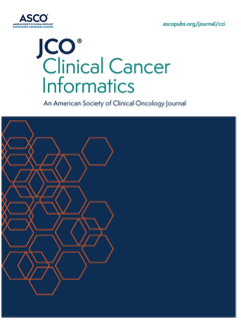 The vast majority of Lynch syndrome patients remain unidentified, and thus unable to benefit from cancer risk reduction and surveillance strategies. This study used data from electronic health records to evaluate the real-world effectiveness of various diagnostic processes to screen patients for Lynch syndrome, for example family history data and tumor screening of newly diagnosed colorectal cancers. The results demonstrate significant drop-off across multiple steps in the Lynch syndrome diagnostic cascade, offering important insights into the gaps in electronic health records that need to be addressed if it is to be used to identify Lynch syndrome patients.
The vast majority of Lynch syndrome patients remain unidentified, and thus unable to benefit from cancer risk reduction and surveillance strategies. This study used data from electronic health records to evaluate the real-world effectiveness of various diagnostic processes to screen patients for Lynch syndrome, for example family history data and tumor screening of newly diagnosed colorectal cancers. The results demonstrate significant drop-off across multiple steps in the Lynch syndrome diagnostic cascade, offering important insights into the gaps in electronic health records that need to be addressed if it is to be used to identify Lynch syndrome patients.
Article available at:ttps://doi.org/10.1200/CCI.23.00157
|
21. Identifying factors and causal chains associated with optimal implementation of Lynch syndrome tumor screening: An application of coincidence analysis (Genetics in Medicine, 25 June 2024)
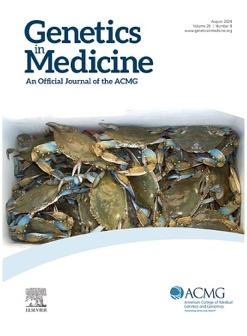 This study follows a previous study that reported patient perspectives on utilizing universal tumor screening to identify patients with Lynch syndrome. This work reports results from 66 stakeholder interviews conducted to identify factors that influence the successful implementation of universal tumor screening programs. We found that successful programs consistently had a maintenance champion and a positive internal environment, while non-optimized programs struggled with mixed internal settings and poor stakeholder engagement. These findings led to the development of a toolkit to guide the successful implementation of universal tumor screening.
This study follows a previous study that reported patient perspectives on utilizing universal tumor screening to identify patients with Lynch syndrome. This work reports results from 66 stakeholder interviews conducted to identify factors that influence the successful implementation of universal tumor screening programs. We found that successful programs consistently had a maintenance champion and a positive internal environment, while non-optimized programs struggled with mixed internal settings and poor stakeholder engagement. These findings led to the development of a toolkit to guide the successful implementation of universal tumor screening.
Article available at:https://doi.org/10.1016/j.gim.2024.101201
|
22. Are employees ready to engage in genetic cancer risk assessment in the workplace setting?
(European Journal of Human Genetics, 2024)
 The paper reviews our team’s experience at one of the employee health fairs we hosted, highlighting that 91% of employees who attended the fair engaged with a clinician to learn about cancer risk and genetic testing and 60% of those expressed interest in completing a genetic cancer risk assessment. If done carefully with the right resources, we believe that employee health fairs and community events could be an effective strategy for expanding access to genetic cancer risk assessment and genetic testing to diverse populations. These events could be especially helpful in reaching populations that are less able or likely to interact with healthcare systems
Our team plans to organize several more community education events over the next
year.
The paper reviews our team’s experience at one of the employee health fairs we hosted, highlighting that 91% of employees who attended the fair engaged with a clinician to learn about cancer risk and genetic testing and 60% of those expressed interest in completing a genetic cancer risk assessment. If done carefully with the right resources, we believe that employee health fairs and community events could be an effective strategy for expanding access to genetic cancer risk assessment and genetic testing to diverse populations. These events could be especially helpful in reaching populations that are less able or likely to interact with healthcare systems
Our team plans to organize several more community education events over the next
year.
Article available at:https://doi.org/10.1038/s41431-024-01655-2
|
23. Considering screening for hereditary cancer syndromes at the time of obstetrical prenatal carrier screening (Cancer, 2024)
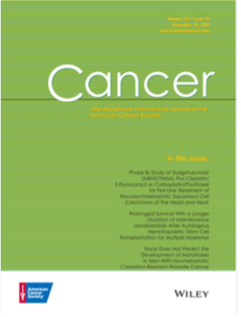 As a follow-up to our cost-effectiveness analysis demonstrating the utility of adding the BRCA1 gen to obstetrical carrier screening, we have comprehensively explored the pros and cons of offering hereditary cancer genetic testing as part of obstetrical carrier panels. We believe that obstetrical screening is a critical potential window for addressing under-recognition of hereditary cancer syndromes, as it offers a unique opportunity for individuals to interact and engage with the healthcare system.
As a follow-up to our cost-effectiveness analysis demonstrating the utility of adding the BRCA1 gen to obstetrical carrier screening, we have comprehensively explored the pros and cons of offering hereditary cancer genetic testing as part of obstetrical carrier panels. We believe that obstetrical screening is a critical potential window for addressing under-recognition of hereditary cancer syndromes, as it offers a unique opportunity for individuals to interact and engage with the healthcare system.
Article available at:https://doi.org/10.1002/cncr.35480
|